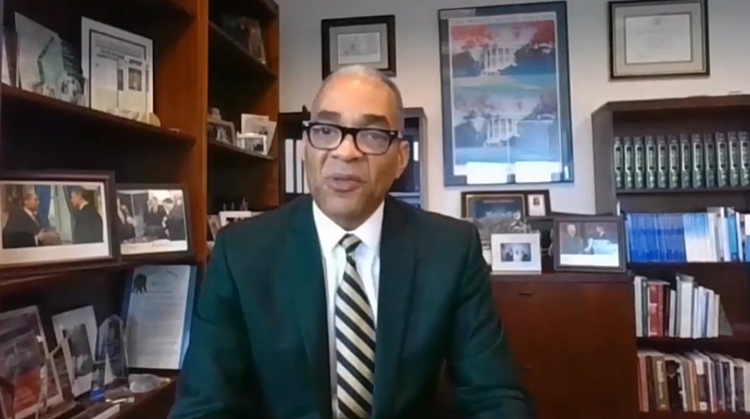Incoming president-elect calls on lessons learned from Detroit riot in speech to House of Delegates

Incoming President-elect Reginald Turner addresses the ABA House of Delegates remotely on the last day of the 2020 annual meeting.
Reginald Turner has spent the past few months comparing the stress of the COVID-19 pandemic, calls for police reform and resulting unrest to the anxiety he experienced during the 1967 Detroit riot, he told the House of Delegates on Tuesday.
His father was a police officer who was “on duty for 24 hours a day for what seemed like an eternity” during the riot, he said. He recalled seeing tanks roll down his street as police and the National Guard tried to restore order, and smelling the smoke of fires burning in the city from his front porch.
Turner, the incoming ABA president-elect and an executive committee member of Detroit-based Clark Hill, also recalled during his speech at the virtual 2020 ABA Annual Meeting that an organization called Focus: HOPE was founded by William Cunningham, a Catholic priest, and Eleanor Josaitis, a Detroit housewife and mother, to help the city and its surrounding suburbs address the social issues that sparked the riot.
Its mission was “both simple and powerful,” he contended.
“Recognizing the dignity and beauty of every person, we pledge intelligent and practical action to overcome racism, poverty and injustice,” Turner read to the House. “And to build a metropolitan community where all people may live in freedom, harmony, trust and affection.
“Black and white, yellow, brown and red, from Detroit and its suburbs of every economic status, national origin and religious persuasion, we join in this covenant.”
He witnessed the work of the organization firsthand as his family was paired with a suburban family in a cultural exchange program and he later told his father he also wanted to be a police officer. He said his father told him that he’d rather he become a lawyer like his friend Elliott S. Hall, a pioneer in the Detroit legal community.
Turner told the House that the “most respected lawyers distinguish themselves by breathing life into the lawyer’s oath.”
“With the powerful words of the oath, we pledge to support the constitutions of our nation and state, to respect our courts and judges and to practice law with integrity, civility and concern for both paying and pro bono clients,” he said.
Turner added that the ABA is “our collective effort to fulfill the lawyer’s oath” and that attorneys who become bar leaders must work to be “truly representative.” In a time of many bar associations and increased availability of CLE content, he said the ABA has responded with a membership value initiative that seeks to build “a more engaged, supportive and financially stable bar association.”
He also told the delegates that ABA members want the association to address public policy issues that “are central to the administration of justice” and “not unduly divisive.” They want the association’s financial resources to be appropriately managed and support its diversity and inclusion programs and access-to-justice initiatives.
“I will strive to fulfill the expectations in the oath in the role of president-elect and president,” Turner said. “I will strive to listen to and learn from ABA members in our sections, divisions and other entities in the effort to understand how we can collectively and collegially fulfill the ABA’s mission to serve equally our members, the profession and the public.”
Turner will begin his year as president-elect at the close of the annual meeting. He will serve as president from the close of the 2021 annual meeting in Toronto through the 2022 annual meeting in Chicago.
He has served as chair of the ABA House of Delegates Rules and Calendar Committee and as vice-chair of the Committee on Issues of Concern to the Legal Profession and Steering Committee of the Nominating Committee. He is also a past president of the National Bar Association and the State Bar of Michigan.
Follow along with our coverage of the 2020 ABA Annual Meeting.
Updated on Aug. 26 to correct the wording of a quote.



